Expert: Donald Tusk’s Official Visit to Tajikistan an Important Diplomatic Achievement

DUSHANBE, 24.06.2019. (NIAT Khovar) – On May 29-30, the President of the European Council Donald Tusk arrived on an official visit to Tajikistan. In addition to meeting with the top officials, he also visited Sarez Lake and the Darvoz district. Tusk’s official visit harmonized the path of mutually beneficial relations between Tajikistan and the European Union (EU) and brought it to a new historical stage. To discuss Tusk’s visit and his impressions about Tajikistan, Jumhuriyat correspondent Bakhtiyor Kutbiddin interviewed an expert on political and social issues, the Dean of the International Relations Department at the Tajik National University Kholmahmad Samiev. Below is the interview.
— Can we call Tusk’s official visit a new page in the political and diplomatic history of Tajikistan?
— Undoubtedly, it is a new historical stage. Tusk’s official visit opened a new page in the history of Tajik diplomacy. Despite the fact that the official representatives of the European countries and the heads of international organizations have been visiting Tajikistan for the last 27 years following its independence, against the background of the difficult geopolitical situation this visit is more significant in strengthening diplomatic relations. Tusk was directly familiarized with many political, social, cultural, internal ideological realities, which had been distorted by the detractors of the government of Tajikistan and came to a correct understanding of the situation. In this regard, undoubtedly, this visit is as a new page in the Tajik — EU diplomatic relationship.
— How do you assess the real significance of Tusk’s visit to Tajikistan?
— During the press conference, Tusk stressed that his visit coincided with the adoption of the new EU Strategy for Central Asia, and he is the first European Council President who has visited Tajikistan.
Therefore, Tusk’s official visit is a clear indication of the close cooperation between the European Council and Tajikistan. Meanwhile, Tajikistan has strong cooperation with the EU and a number of regional and international organizations, and cooperates with all countries of the world within its open-door policy.
The EU is one Tajikistan’s important partners. This point was emphasized by Tusk at the press conference, which took place following the meeting with President Emomali Rahmon.
«Tajikistan remains an important and strategic partner of the European Union. The regional location of Tajikistan is of great strategic importance, and the role of Tajikistan between Europe and Asia opens up new ways for a modern partnership,» said Tusk.
Therefore, the cooperation between Tajikistan and the EU will reach a new stage and we can expect further transformations in the context of such visits.
— In your opinion, what important issues were discussed during the meeting between President Emomali Rahmon and President Tusk which may affect the prospects of a foreign policy of a sovereign state?
— First of all, President Emomali Rahmon had a warm and sincere meeting with President Tusk. The welcoming ceremony was held in accordance with the requirements of the protocol of state visits. In other words, the welcoming ceremony was held with the participation of the commander of the Guard of Honor, the sound of the national anthem, the passage in front of the soldiers’ ranks, respect of the high-ranking guest toward the flag of Tajikistan, familiarization with the official delegations of the two sides and the parade of the military units of the Guard of Honor. Further, a top level meeting between President Emomali Rahmon and President Tusk was held and continued with the extended negotiations of the two parties’ delegations.
The meeting focused on the current state and prospects of Tajik — EU relations. During the meeting, the parties discussed a range of issues, including bilateral political, economic and socio-humanitarian cooperation, as well as the implementation of previously signed documents, including the agreement on cooperation and partnership between Tajikistan and the EU.
Also, a positive assessment was given to the role of the Cooperation Council, the Cooperation Committee and the Development Subcommittee, the political dialogue of security and the dialogue of human rights in strengthening relations.
— Of course, the issues of security and regional stability, as well as current contemporary topics did not remain unmentioned.
— Yes, the meeting also focused on the issues relating to the regional security and stability, including jointly combating undesirable phenomena such as terrorism, its horrific consequences, the spread of religious extremism in the region and the world, the threat of drug trafficking and arms smuggling. Moreover, cooperation with the EU, in particular within the framework of the BOMCA and CADAP programs towards strengthening the defense potential of the state border with Afghanistan was highlighted. It was expressed that in connection with the formation of the majority of terrorist groups in the northern Afghanistan, measures to strengthen the border line by increasing the EU assistance are continuing.
Most importantly, the EU and President Tusk understand the seriousness of security issues and regional stability, which are at the forefront of various threats and dangers, and have taken sustained steps to address the problems of security and protection of state borders.
— Did the parties discuss terrorism and religious extremism in the region that are fueled by political Islam?
— The topic of religious extremism and terrorism as the most sensitive topic of the modern period, which is more inclined to political Islam, were also discussed as part of the issues relating to security and regional stability. Undoubtedly, Tusk is well versed in matters of religious extremism which seeks to be present and to strengthen its status in the region. He is well aware of political programs that are working for the benefit of some regional and world powers.
Moreover, Tusk also addressed the issues relating to the fight against extremist and radical religious groups, which calls into question security and stability in the context of political reform, and recognizes the collective struggle as the main factor of regional and world stability by the top level bodies of the European Council. This is one of the achievements of Tusk’s official visit.
— It is known that the official visit of the European Council President to Tajikistan caused much resonance in the independent informational and analytical agencies. What do you think about this?
— As it is clear from the context and results of Tusk’s visit, European governmental and diplomatic circles express satisfaction with the visit and positively praise its outcome for both parties. Naturally, for other circles, in particular, some propaganda mass media that covertly fight for the terrorist and extremist organization the Islamic Renaissance Party (TEO IRP), Tusk’s visit incited fears. They expected something else from this visit, but their hopes were not justified. Hence their violent attacks in the periodicals and social networks.
The essence of the claims of some websites, extremist agencies and social networks is that Tusk did not openly discuss and criticize the human rights situation in Tajikistan and ignored this topic. Foreign critics, including the IRP and its supporters, associate the meeting of the European political leader with the strengthening of Europe’s position in Central Asia and arrive at the conclusion that Tusk does not want to jeopardize relations with the leaders who violate freedom in order to strengthen relations with Central Asia. Thus, anti-national groups’ assessment of the visit of the European Council President Donald Tusk to Tajikistan is biased.
— Renaissance (meaning the Islamic Renaissance Party banned in Tajikistan), in our opinion, most of all considers itself to be disadvantaged, doesn’t it?
— Of course, the Renaissance leadership and the circles related to it are shocked by this meeting. They did not expect that Tusk’s official visit would be so successful for the state and the government of Tajikistan. The Renaissance elite and their associates who were connected to the self-proclaimed National Alliance of Tajikistan hoped that the European political leader would please them and open the way for them to gain prestige in the region.
The concepts of «democratism,» «democracy,» «parliamentarism,» «secularism,» «liberalism,» and such are firmly established in the use of certain groups and foreign political organizations that, in abusing such principles, consider themselves to be the irreconcilable opposition to the government of Tajikistan. Hiding behind the aforementioned terms, they wish to present themselves as supporters of a democratic regime and call upon powerful western countries and organizations to support them. For example, filing complaints to the EU and OSCE is one of the programs or methods of the so-called Tajik opposition in Europe.
As we have seen, Tusk’s visit to Tajikistan was not advantageous to the interest groups, and the European political leader returned from Tajikistan to Europe with positive impressions. It seems realistic that independent foreign media, which are of interest to groups opposed to the government of Tajikistan, react to Tusk’s visit and call it irrelevant for the development of democracy and the protection of universal human values. Since their hopes were not justified, criticism resounds. This is, in our opinion, the reason for the antagonistic response from Tajik groups, who abroad call themselves the opposition.
— What does the IRP and other such groups, which we have mentioned, hope to gain by seeking the support of international organizations, the EU and the European Council president?
— Firstly, the so-called opposition groups to the government of Tajikistan, behind which there is a false coalition — the National Alliance of Tajikistan, need the support of reputable international organizations and influential political associations to intensify their activities in the light of foreign support. They see authoritative Western organizations as defenders of democratic principles. While the ideas of the Renaissance opposition are completely contrary to democratic values and humanism, its leadership uses liberal and democratic values as a political tool in its political activities and mentions freedom of thought and civilization only as a means of achieving its goals. Therefore, opposition groups rely on the authoritative international organizations. Unfortunately, the policy of double standards of some of the world’s authoritative organizations has led to the fact that extremist groups in the region are raising their heads and sowing instability.
— Some human rights experts believe that after 2015 there was a stagnation of democratic values and restrictions of freedoms in Tajikistan, but the meetings of the European Council President refute their arguments.
— I completely agree with you. The supporters of that view and thinking present the Renaissance as a progressive force and advertise it as such abroad. This is not new. For many years, some domestic and foreign independent experts were and continue to be at the mercy of this stereotype. What problems did the Renaissance solve while it was a part of the political space of Tajikistan, except for clouding people’s minds, furthering its party ambitions, demagogy and false experiences from the social disorder? The removal of the Renaissance from the political arena of the country is a renaissance itself. False virtue, ambition, hypocrisy and self-exposure, involvement in a coup d’etat led to the fact that the renaissance was outlawed.
Regarding the elections and their transparency, it should be noted that four years ago, the Renaissance failed to get the necessary number of votes and lost its seats in the Supreme Assembly (parliament). The election process was monitored by regional and international observers and at that time the political campaign was assessed as meeting international standards. Of course, in the process of conducting political campaigns (meaning parliamentary elections), there were flaws and shortcomings, which is quite natural. But on the whole, the elections in Tajikistan were normal, the parties and factions which gained the necessary number of votes passed to the parliament. Who is to blame for the fact that the opposition party did not break through to the parliament?
— During his visit, Tusk visited Sarez Lake and got acquainted with the charming and unique nature of our region. Tusk also visited the picturesque Darvoz district and had a sincere meeting with the representatives of various social strata. Such meetings, of course, change the vision of the European political leader in relation to the people and the unique nature of Tajikistan.
— Certainly. Tusk not only visited Sarez Lake, which is one of the largest sources of fresh water in the world and has a rich and unique nature, but also positively assessed the vast water resources of Tajikistan, calling the country’s beautiful and unique nature a great natural treasure. Broadcasts of Tusk’s visit revealed the European political leader’s impressions regarding the uniqueness of our land, the sources of fresh water in Tajikistan, and the initiatives of the head of state on issues relating to water problems and providing the population with drinking water.
«When we look at this rare lake, we see, above all, the priceless gift of nature, — water. We must use and consume water rationally, since this nature’s gift is an important treasure. Indeed, such wealth of Tajikistan is not present in any country of the world. Fresh water and beautiful nature inspire by their views. In the middle of the mountains lies a treasure that is the savior of mankind,» said Tusk, while telling reporters about his impressions following his visit to Sarez Lake.
Continuing his tour, Tusk visited the Palace of Women and the Chorchaman state-owned retirement home in the Darvoz district. Handicrafts of artisans were showcased in the Palace of Women. National dishes and handicrafts by local residents of this mountainous district were shown in Chorchaman. The European delegation enjoyed the view of the beautiful sites and water sources of this region, changed its impression of the paradisal Tajikistan, and its hardworking people. The guests saw for themselves the political, social, spiritual, cultural, and creative reality of our country, and it was this that changed their perception. The change in the relation of the European political leader could be seen from the broadcasts of his trip in the local television channels.
— Sometimes the media talks about the discussions and debates between the government of Tajikistan and international organizations. Do these discussions relate to the EU and European political leaders?
— It should be noted that sometimes verbal debates prevail, but there is no problem between Tajikistan and the EU. Debates and discussions of important and key issues have always been at the center of attention of the activities of international organizations and the country leaders, and today’s conditions are not an exception to this rule. Debates, discussions and criticisms contribute to the development of democracy and humanism. Moreover, at a press conference devoted to Tusk’s visit, President Emomali Rahmon stressed that the friendly relations between Tajikistan and the EU during the period since our state’s independence are based on the principles of equality, mutual understanding, mutual respect and trust and the compliance of mutual interests. Today this influential world organization is considered one of Tajikistan’s important partners in the international arena.
In addition, on the basis of the Agreement on Cooperation and Partnership between Tajikistan and the EU, which was signed ten years ago, the ties of the parties have expanded. In the framework of the National Development Strategy until 2030, which determines the key factors, ways and means of long-term and sustainable development, Tajikistan wants to see the EU along with the United Nations Development Program as key partners in the implementation of this strategy. In other words, Tajikistan sincerely welcomes the new EU Strategy for Central Asia which was adopted this year. With full certainty, it can be said that there is no misunderstanding between the EU and the government of Tajikistan. The visit of the European political leader to our country proves once again that mutual understanding in all spheres prolongs the life of the union of Tajikistan and the EU.
— The opposition insists that human rights are violated in Tajikistan and that there are restrictions in the sphere of freedom of speech and conscience. Those that call themselves the opposition were waiting for President Tusk to tackle this particular issue. How true are their views?
— The so-called opposition pays special attention to the topic of freedom of speech and human rights in order to assume a certain political image and be recognized as a political force abroad, because it knows that serious programs in human rights and human freedoms are important in Europe, and there are huge investments in this direction. The opposition constantly returns to this topic and exists due to this reason. But in Tajikistan, the European political leader saw himself the situation concerning human rights and freedoms.
Of course, we don’t say that there are no problems in this area in Tajikistan, and that the laws are implemented one hundred percent. There are problems, and the government is putting tremendous effort to address them. Another point is that our society interacts very little with the government in solving problems, and sometimes the neutrality of civil society aggravates the problem. But if the so-called opposition implies that there is a restriction of freedom of conscience because of the closure of several illegal mosques or the imprisonment of religious criminals, then it is greatly mistaken.
Freedom of conscience implies that every person within the framework of existing legislation can have any conviction, join any religion and in no way can have beliefs imposed on him or her. But our religious circles, especially the fanatical clergy, impose their beliefs and accuse people who hold different beliefs of blasphemy. Is this freedom of conscience? Or does freedom of conscience apply only to Muslims and the Hanafi school? Those who profess a different religion or have a different conviction enjoy equal rights under the current legislation. Therefore, the Constitution of Tajikistan equally protects the rights of all citizens, regardless of status, religion, and nationality. It is necessary to comply with these standards and not engage in idle talk about religion and piety. Unfortunately, in our society, piety and hypocrisy have grown together. Every prude considers himself devout and puts himself above the others.
Fortunately, Tusk familiarized himself with the realities of the state and in the future will come to know the people who distort these realities.
— It follows from the content of the interview that Tusk’s official visit to Tajikistan was successful.
— Yes, the official visit of President Tusk to Tajikistan was successful. The high level of hospitality, organization of meetings and talks, trips to Sarez Lake and the Darvoz district, familiarization with the art of crafts of the population, meetings with the representatives of cultural society, and the tour through the unique nature of the country, ultimately resulted in an amazing impression and inspired the confidence of the European Council President in the bright future of Tajikistan. Moreover, Tusk as a successful diplomat, made a fruitful trip to Tajikistan and will long remember his visit and meetings with the political leadership and its people. In addition, this visit will create favorable conditions for the development of bilateral relations between Tajikistan and the EU in a new historical era.
— Thank you for the interesting conversation.
— Good luck.
Reprinted from Jumhuriyat











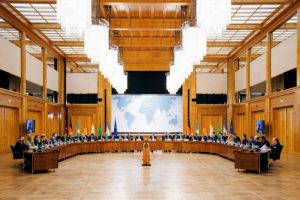 Tajikistan Highlights Investment Potential at C5+1 Economic Roundtable in Berlin
Tajikistan Highlights Investment Potential at C5+1 Economic Roundtable in Berlin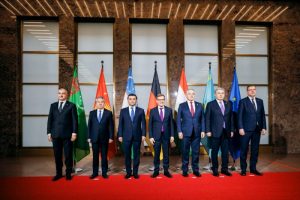 Tajikistan Participates in First Central Asia–Germany “C5+1” Foreign Ministers’ Meeting in Berlin
Tajikistan Participates in First Central Asia–Germany “C5+1” Foreign Ministers’ Meeting in Berlin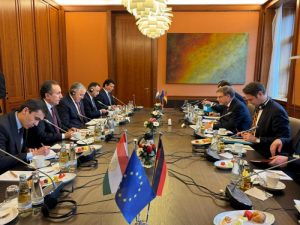 Tajikistan and Germany Discuss Expansion of Bilateral Relations in Berlin
Tajikistan and Germany Discuss Expansion of Bilateral Relations in Berlin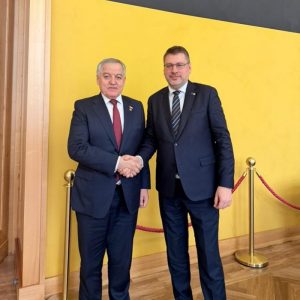 Tajikistan-EU Cooperation Discussed in Berlin
Tajikistan-EU Cooperation Discussed in Berlin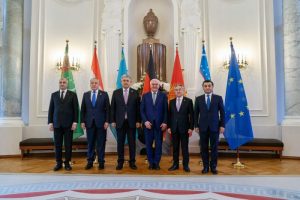 Federal President of Germany Receives Central Asian Foreign Ministers in C5+1 Format
Federal President of Germany Receives Central Asian Foreign Ministers in C5+1 Format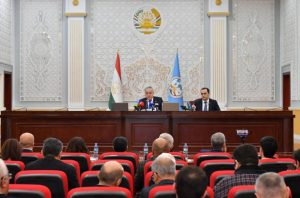 Tajikistan Issued 77,215 Visas to Foreign Citizens in 2025
Tajikistan Issued 77,215 Visas to Foreign Citizens in 2025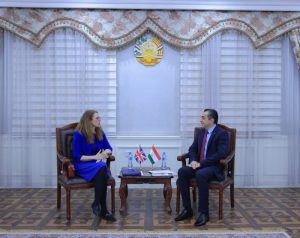 Tajikistan and the UK Explore Ways to Strengthen Political and Economic Cooperation
Tajikistan and the UK Explore Ways to Strengthen Political and Economic Cooperation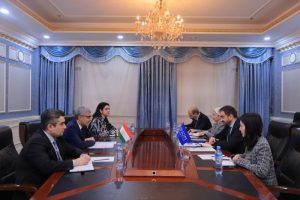 Tajikistan–IOM Cooperation Discussed in Dushanbe
Tajikistan–IOM Cooperation Discussed in Dushanbe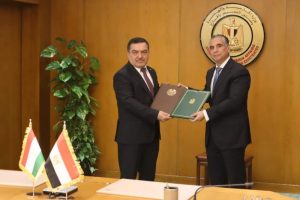 First Consular Consultations Between Tajikistan and Egypt Held in Cairo
First Consular Consultations Between Tajikistan and Egypt Held in Cairo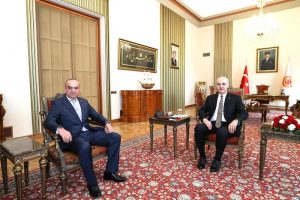 Tajikistan, Turkey Highlight Importance of Expanding Inter-Parliamentary Cooperation
Tajikistan, Turkey Highlight Importance of Expanding Inter-Parliamentary Cooperation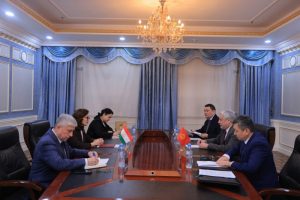 Tajikistan, Kyrgyzstan Discuss Implementation of Bilateral Agreements in Dushanbe
Tajikistan, Kyrgyzstan Discuss Implementation of Bilateral Agreements in Dushanbe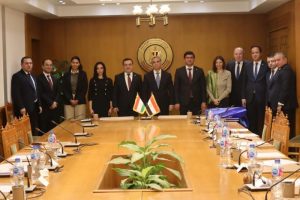 Political Consultations between the Foreign Ministries of Tajikistan and Egypt Held in Cairo
Political Consultations between the Foreign Ministries of Tajikistan and Egypt Held in Cairo














